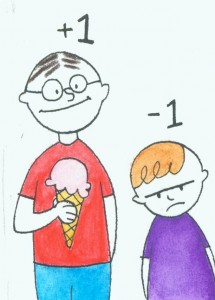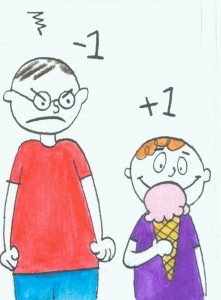Competition, Zero Sum Games, Free Markets and the call of Christ

I win, you lose 🙁

I lose, you win 🙁
Winston Churchill is credited with saying, ‘Democracy is the worst form of government except all the others that have been tried’. I found myself wondering if Polanyi might have said the same, substituting capitalism for democracy.
This, is in some ways, my primary take away from Karl Polanyi’s The Great Transformation: The Political and Economic Origins of our Time. Though written over a half-century ago, the work and it’s conclusion are as relevant now as they were in the immediate aftermath of World War II. The book is a powerful critique of the free market and the capitalist principles that have guided the Western world for the last couple centuries.
Polanyi might agree with Churchill’s modified quote, but in large part because we haven’t tried – at least not fully to attempt to live into the alterations to a free market system that he suggests. The problems he sees with the free market – and the continued attempts to ‘disembed’ it from governments, he believes – perhaps with a little too much influence from the post-war glow of optimism so prevalent in his time – can all be resolved by leaning into increased control and influence of the government.
Polanyi identifies the issues and shortcomings associated with an unflinching trust or faith in the free market itself. One of the biggest shortfalls of the self-regulated free market – in spite of it’s claim that it is good for all – is that it very much operates as a zero sum game. There are clear winners and losers in the market and if human labor etc. is just another resource to be allocated and priced/valued by the market itself, the competition that is created can become incredibly fierce.
In the years after Polanyi wrote this work, our entire world essentially became a competition between those that were faithful to the ideals of the free market as it came to be established within democratic societies and those societies that aligned with a communist ideal and accepted fuller government intervention in the markets.
I think this is an important note as we think about Polanyi’s ideas and their acceptance, especially in the USA, where the democratic idea of freedom became so associated with the economic idea of the unregulated free-market that the very word ‘socialism’ became a sort of political dirty word that was closely associated with the curtailing of freedom and even ‘oppression’ by the government.
One of the most harmful aspects of this free market system is the ability is has, through our competition with others around the corner and around the world, to create barriers and divisions between us. We see other people as ‘other’ -meaning not part of us and it makes it easier to accept the zero sum game.
Polanyi makes well the point that the first great transformation – that of the liberal free market system coming to fore, precipitated the second – the rise of fascism. It seems as though, in our current situation, we are seeing history repeat itself, as an over emphasis on the strength, power and even the moral goodness of the free market system, we are seeing the rise again of fascism and authoritarian regimes. The cruel irony is that the systems and controls that Polanyi suggests the government implement to counteract the rise of fascism and the realities that bring that rise, we seem unwilling to even attempt – precisely because they don’t line up with our devotion to the free market.
As those seeking to follow Christ – we are no longer given the luxury of seeing anyone (an individual or a group of people) as ‘other’ from us. We are told that ‘there is no longer Greek nor Jew, slave nor free….’ in the body of Christ and we are called to love our neighbor (which according to Jesus is, basically everyone) as we love and care for ourselves.
So beyond looking to simply move beyond the zero sum game that we so often play, and which separates our world into ‘us’ and ‘them’. Jesus tells us – as MLK reminds us – see the quote below – that there is no ‘them’, we are all in this together. I can’t ‘win’ if it means that you lose. In terms of our global relationships we don’t always see these consequences immediately – and in fact, as Polanyi (and others) have pointed out, the real consequences of these wins and losses often take decades to manifest themselves, but the ‘chickens always come home to roost’.
The call of Christ on our hearts and our lives bids us to step away from the competition with each other, the zero sum games we play against each other and to seek and share the true freedom that is found only in and through Jesus Christ.
8 responses to “Competition, Zero Sum Games, Free Markets and the call of Christ”
Leave a Reply
You must be logged in to post a comment.
This is certainly the scenario in the USA, Chip, which is the ultimate free market economy. Europe is a little different. Denmark has been voted the happiest country on earth, and it has a strong social welfare element. A number of the Scandinavian countries seem to focus more on work/life balance and on providing social protection against the vagaries of the free market. I think they are on to something, and seem to be happier for it. America (and Britain not far behind) seems much more cut-throat – the zero sum game that you write about.
Geoff, yes! If my brain, and hence my post, were more clearly organized, I would have highlighted this. The capitalist free market base, with strong elements of socialism seem to do a much better job of providing well for all of the people……
In the USA, at least, socialism is still so closely tied to the boogey man of communism, that people are irrationally afraid of it and against it.
I am ready to immigrate to Norway, I think!
Chip, I agree – “Polanyi makes well the point that the first great transformation – that of the liberal free market system coming to fore, precipitated the second – the rise of fascism.”
Here in the US, while we have elements of socialism – taking care of our poor through the redistribution of wealth to welfare recipients, government control of the land through property taxes, etc… – there is an even bigger element of fascism. Fascism in practical terms is when government and big business work together to the benefit of each other. Do you see this in our country?
Mary, I do see this in our country. And I really think a lot of it has to do with how we define ourselves as ‘americans’…. While there are a lot of positive traits we use to describe ourselves, we also describe ourselves by what we are not.
I know so many people for whom socialism is a bad word – and many of them don’t even know what socialism really is.
Somehow we have equated programs that provide for the welfare of our citizens as somehow anti-freedom.
And big business has certainly used this to their advantage, as we only have to look to our healthcare system to see that clearly.
Chip, I’m glad that you highlighted this dynamic—”As those seeking to follow Christ – we are no longer given the luxury of seeing anyone (an individual or a group of people) as ‘other’ from us.” If we look at people through economic or political eyes (I won, you lost) our view becomes other than Christ-like. I think as believers we have a different mission, to see the world through the eyes of Christ. It’s not always safe, but I feel the call to serve is always greater than the call to win! Thanks for your post.
Thanks for your post Chip
Your statement that we use the term other because they are not a part of us is so true. We must start this first in the church. We are separated in the faith and we see each other as “other”.
Thank for MLK’s statement. Great for Black History Month 🙂
Yes, to all this.
Seriously, as long as we view others in competition with ourselves over limited resources, rather than being on the “same side” (we’re all in this together), we will always have an unjust society.
..”there is no ‘them’, we are all in this together. I can’t ‘win’ if it means that you lose.” This statement is EVERYTHING!!! I believe that is what we in America are missing as we deal with how to move forward in the midst of our current political climate. We all have to understand that either we all win or no wins. I do understand that there are complexities that exist in shifting the current American systemic paradigm but we cannot stop advocating and fighting!